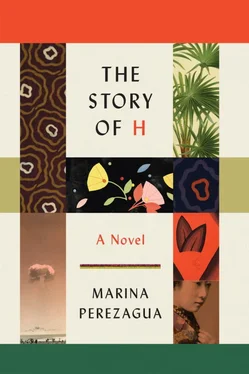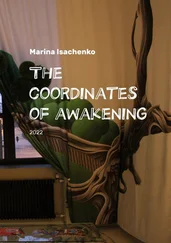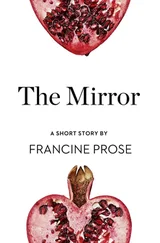According to the woman at the mine, my daughter wasn’t allowed to speak much or my granddaughter either. Baby Yoro had been left unprotected when her mother died. Cannon fodder from the day she was born. To begin with, being the offspring of a black father and an Asian mother, she was neither-nor, mzungu tali tali . But she had certain features that set her apart too. Mostly the shape of her eyes and her very long neck. A Burmese guard who had helped her mother for years had placed a few golden rings around her neck as the girl grew to protect her from lions, he said, though he said different things at different times, like how the rings were symbols of nobility in his land. But what lions? And what nobility? Such things don’t exist underground.
When Yoro died, baby Yoro was taken to a refugee camp outside of Goma. With my eyes wide open when I arrived in the city, the first thing I saw was prostitution. That’s right, alongside all the five-and-dimes, prostitution is how many of the women eke out a living, selling their bodies for food or money. It’s why I could never understand this need for soldiers to rape underage girls or pay for sex with them in cookies or Fanta. Later it was explained to me when we arrived in the refugee camp. The soldiers figured these girls were more likely to be healthy; they wanted to avoid catching sexually transmitted diseases. As demand grew, prostitutes began arriving from surrounding areas, as happens in other countries, and set up shop there to satisfy the hankerings of UN people who, however much they try to hide the fact, are a cog in the machine that leads to human trafficking of minors.
There were hundreds of rape victims in that refugee camp, underage and adult women alike, who gave birth to what came to be known as a “MONUC baby,” meaning a baby conceived by rape or a criminal sexual transaction on the part of a UN blue helmet. Only girls not young enough to have had their first menstrual cycle were safe from unwanted pregnancy. I could verify it all on my own from firsthand testimonies in situ. Hanging all over the UN’s central pavilion were posters with illustrations prohibiting sexual relations with minors. Many women go to the UN for help. Can you imagine what it must feel like for them to encounter all these warnings directed at the peacekeeping staff, posted all around their supposed sanctuary? Just think of the confidence generated by all these posters in the selfsame headquarters of the people who have supposedly come to their country to protect them. It’s as if a wounded person showed up at a hospital where the operating room had posters in the halls around it reading “Killing patients is not okay.”
A journalist once told me that when soldiers are issued their uniforms, they are also given cards listing ten rules of conduct, one of which is the fact that sexual abuse is prohibited. Just the thought of some soldier, some keeper of the peace, carrying such a card in his pocket disgusts me. Ten rules on a pocket flash card like those learning aids with vocabulary words so you can learn a new language while on the subway or standing in line. A quick memory prompt on a perverse backcloth: it’s for memorizing the terrible acts that are prohibited as if they were something new; the word rape on a flash card, the verb, was no more than something you had to learn consciously not to do. You study the lesson of “I shouldn’t rape” by the same method you employ to learn that in Spanish mesa means “table.” So you memorize it. And if you happen to forget, all you have to do is pull the card out of your pocket, remind yourself, and start all over again. If it should happen, the important thing is to follow the next step: hide it.
That’s how things were in the Congo. You know it perfectly well. Over twenty thousand soldiers came to protect the country in what was the United Nations’ most important peacekeeping mission. But they only made the situation far worse. It’s said that when the dying ends, so do the jobs, reason enough for soldiers to instigate internal conflicts to keep their double pay: military wages from their countries of origin and from the UN. I think people were hopeful at the outset, but when I walked through that camp, all the refugees wanted to know is when they would finally be left in peace or in war, but without all these peacekeeping forces with their blue helmets. Most victims lacked the resources to accuse their rapists, especially in a country where countless people couldn’t even tell you the day or year they were born. The most dedicated personnel did what they could and had even supported the creation of a soldiers’ DNA bank to determine the paternity of MONUC babies and to be able to file the appropriate criminal charges. Most soldiers agreed to the idea of a DNA bank, since accusations could be leveled against anyone, even the innocent, though, in general, innocent or not, what happened in the Congo has been the result of a great conspiracy of silence protected by the only organization in the country with money and means.
I ate lunch with the soldiers while I was visiting the refugee camp. The meat—they said while serving me—is Argentine; the cheese is French; the after-lunch coffee, Colombian; and the chocolate, Belgian. Everything was paid for by the UN. The mind, sir, which at times takes us down paths that we’re ashamed to acknowledge, played a little trick on me, and I wondered while I ate why the soldiers couldn’t show a little decency and pay the girls with some good roast chuck ribs and chocolate, instead of Fanta and cookies. What a shame the Congolese children haven’t tasted chocolate. I was mortified when I found myself thinking such a thing. And I thought back to what they had said, that the Congo changes even those with the best of intentions and I felt for an instant closer to the criminals than the victims.
YORO HADN’T GONE UNNOTICED in the refugee camps in Goma. They told me she’d gone to work voluntarily, wearing the rings around her neck, in a sort of zoo or menagerie on the outskirts of the city, built by the great Congolese military chief. Yoro probably thought, rightly, that a zoo is a better refuge than a refugee camp in a place where people had become like beasts.
When I got there, I saw the damages the rebellion had caused the day before. I was sure this was finally it, though, the last link that would bring me to Yoro. The zoo. All I wanted was to get onto the grounds, which when seen from outside were torn apart, full of howling creatures, bloodied. I thought it might be more practical to use the old wad of money instead of a door, always the black market. But there was no need to pay; a fire had razed most of the premises. Later I found out the zoo had been left to the grace of god a while before, a god that didn’t exist.
I don’t know why I even bother to write what happened once I got into these brand-new ruins because you certainly don’t deserve to know. You don’t deserve to know how I felt when I found Yoro. Writing even three words that might help you imagine what that moment was like would be a sign that I don’t love myself very much. It’s a matter of my own heart, something at once so beautiful and so painful that I refuse to waste time explaining to you how my entire life transformed in a single flash. Of course I explained it to my dead Jim as soon as I was calm enough and had the proper distance, which allowed me to write at a remove from the fever of that moment. Below is the letter I wrote to Jim. It’s written as if I really thought he could read it. Maybe the merciful, humane reader would like to know the details that preceded the end of my story, if someday you ever want to share this testimony with others and satisfy my last wish. You, sir, can just skip these pages, I wrote them for Jim, so move along to where I explain the only thing you care about in this case, which is my crime.
Читать дальше












